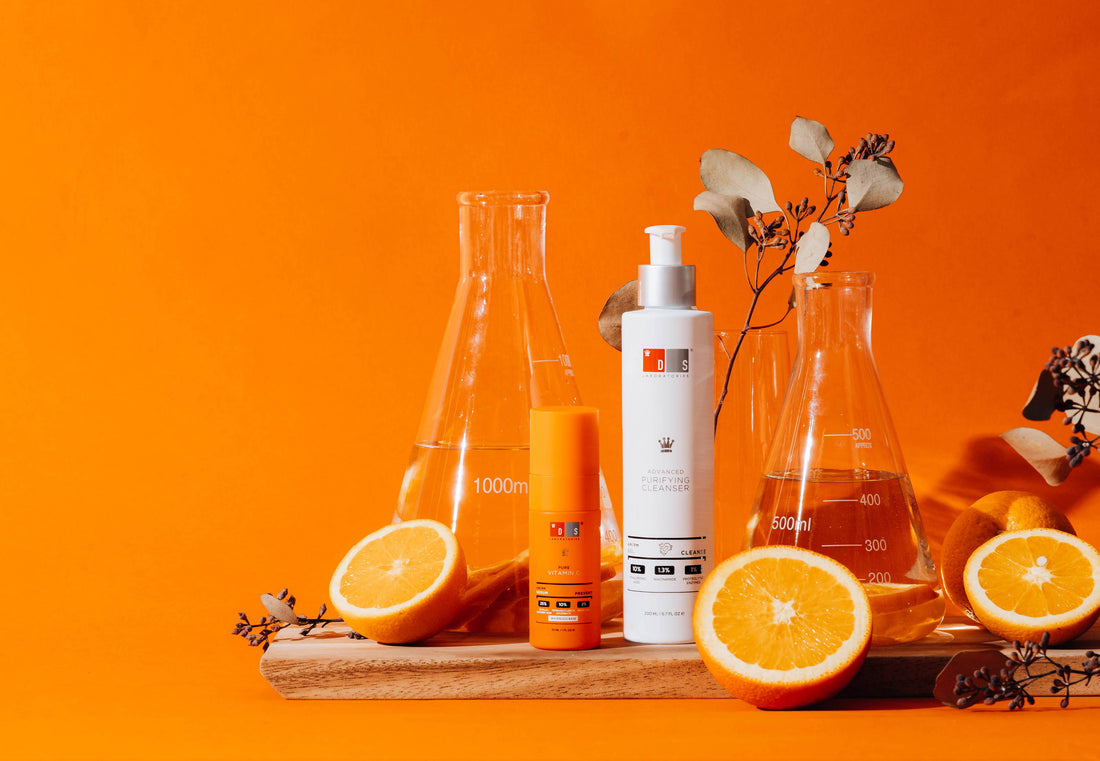To achieve smooth and fresh skin, experts often advocate for a balanced diet, an active lifestyle, top-notch hygiene, and suitable skincare products.
Browsing the skincare market for the best products can be quite overwhelming. There are seemingly endless options, but the most recommended and prescribed products include those that contain tretinoin and Vitamin C.
Whether you have acne, wrinkles, fine lines, or dull skin, these two ingredients can significantly improve your skin condition.
But can you use them together?
Tretinoin is a powerful retinoid that can remove fine lines, fade wrinkles, and correct uneven skin tone. Vitamin C is a potent antioxidant that protects the skin from environmental damage.
Can using them together improve the health and appearance of your skin, or will the combination of strong ingredients lead to adverse side effects? This guide outlines everything you need to know about each and what happens when you pair them in your skincare routine.
All About Tretinoin
Tretinoin (also known as retinoic acid or Vitamin A acid) is a potent, naturally occurring Vitamin A metabolite with a wide variety of benefits for the skin. When applied topically, tretinoin has been shown to improve the appearance of fine lines, wrinkles, irregular skin pigmentation, and other signs of aging. It can also unclog pores and reduce the severity of acne breakouts.
It works by increasing the turnover of skin cells—they divide and die off more quickly and are replaced by new and healthy cells, leading to smooth and soft skin.
Tretinoin is available in both over-the-counter and prescription strength formulations. It is the only FDA-approved topical treatment for acne and wrinkles.
It can be used as a cream, gel, or lotion, often prescribed to be applied to the skin once or twice a day. It is crucial to use tretinoin only as directed—overuse can cause skin irritation and permanent damage.
Tretinoin is only available by prescription in the United States. If you are considering using tretinoin for your skin because you’ve read about its many benefits, consult a dermatologist or other skincare professional to ensure it is the right option for you.
Note that tretinoin can make the skin more sensitive to sunlight, so it is vital to use sunscreen when using this medication.
Side Effects of Tretinoin
When properly prescribed and used as directed, tretinoin is safe and effective for most people who use it. However, like all medications, there are side effects you should be aware of, such as dryness, redness, and irritation.
In most cases, these side effects are mild and go away with continued use, as the skin acclimates to the integration of this powerful ingredient. If irritation persists for consecutive weeks, talk to your dermatologist.
All About Vitamin C
Vitamin C is an essential nutrient found in many foods, such as citrus, leafy greens, potatoes, and more. It is crucial in many body processes, and it helps to:
- Build and maintain strong bones and teeth
- Heal wounds
- Boost the immune system
- Protect the body against infection
Vitamin C also protects the skin against damage from UV rays, pollution, and other environmental stressors. It also boosts collagen production, which gives the skin a youthful appearance.
Because Vitamin C is found in many fruits and vegetables, it is relatively easy to get the recommended daily dose (75 to 90 milligrams). But if you want to boost its positive effects on the body, you can take supplements to ensure you get enough of this vital nutrient.
Side Effects of Vitamin C
Vitamin C is entirely safe, but if you take more than the daily recommended dose (or more than 2000 mg), you can experience diarrhea and nausea. An elevated blood glucose level could also be exhibited, which can be a problem for people with diabetes. Fortunately, the body does not store Vitamin C, so you only need to drink water to eliminate any excess from your body.
Tretinoin and Vitamin C: Good Together?
For many years, using tretinoin and vitamin C in combination was not advised. However, recent studies show that combining them produces a stable and effective skincare solution.
Vitamin C is water-soluble, while tretinoin is soluble in oil. A pre-combined treatment was shown to improve the overall appearance of the skin. Both ingredients work in tandem to reduce the appearance of fine lines, wrinkles, and dark spots.
People who use these two separately as part of their skincare routine—for example, vitamin C as a serum and tretinoin as a topical cream—do not experience any problems. But when both products are layered onto the skin at once, it can lessen the effect. This means that using a pre-combined product that contains both ingredients will lead to more skin improvements.
Conclusion
Tretinoin and Vitamin C are each effective treatments for various skin conditions. Vitamin C can protect the skin from damage, while tretinoin improves the appearance of aging and uneven skin. When used together, these two ingredients can help create a youthful and radiant complexion.

